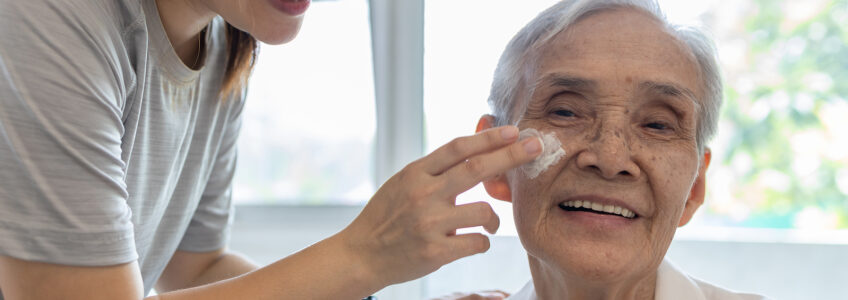
As we age, our skin undergoes significant changes. For seniors, these changes often mean their skin becomes thinner, drier, and more sensitive to environmental factors. The seasonal shifts in temperature, humidity, and air quality can make things worse.
With that knowledge in mind, it becomes easy to see why seniors need to adapt their skincare routines throughout the year, which is something senior home care can help with.
Winter: Combating Dryness and Sensitivity
Winter brings harsh, cold air outside and dry, heated air indoors—a combination that can severely dehydrate aging skin. Seniors often experience increased itchiness, flaking, and even painful cracking during winter months.
Winter Skincare Tips
- Switch to a richer, oil-based moisturizer applied immediately after bathing
- Reduce bathing frequency and use lukewarm (not hot) water
- Consider adding a humidifier to sleeping areas
- Protect exposed skin with scarves and gloves when venturing outdoors
- Don’t forget SPF protection, as winter sun can still damage skin, especially when reflected off snow
Spring: Managing Allergies and Transition
Spring brings relief from winter’s harshness, but introduces pollen and other allergens that can irritate sensitive senior skin. This transitional season requires gradual adjustments, which senior home care providers can help seniors incorporate.
Tips for Spring Skincare
- Gently exfoliate to remove winter’s dry skin buildup
- Transition to lighter moisturizers as humidity increases
- Be mindful about rinsing pollen from skin and hair
- Watch for redness or irritation that might indicate allergic reactions
- Begin increasing sun protection as outdoor time expands
Summer: Protecting Against Sun and Heat
Summer presents significant challenges for aging skin. Seniors are more susceptible to heat-related skin issues and sun damage, while many medications taken by older adults can increase photosensitivity. Senior home care providers can help seniors with sun protection and hydration during the warmer months.
Summer Skincare Tips
- Senior home care can remind seniors to use broad-spectrum SPF 30+ sunscreen daily, reapplying every two hours when outdoors
- Seek shade and avoid peak sun hours (10 am to 4 pm)
- Stay hydrated to support skin’s moisture from within
- Choose lightweight, breathable fabrics to minimize heat rash
Fall: Repairing and Preparing
Fall is the perfect time to repair summer skin damage while preparing for winter’s challenges. The moderate temperatures and humidity levels make this an ideal season for skin recovery.
Tips For Fall Skincare
- Use products with antioxidants to repair summer sun damage
- Gradually increase moisturizer richness as the air becomes drier
- Check skin thoroughly for any new spots or changes that might indicate skin cancer
- Reintroduce gentle exfoliation if it was reduced during summer
- Ensure adequate vitamin D intake as sun exposure decreases
Year-Round Essentials for Aging Skin
Regardless of the season, senior home care providers can help seniors:
- Maintain consistent hydration by drinking plenty of water
- Use fragrance-free products to minimize irritation
- Consult with a dermatologist annually for a professional skin check
- Be mindful of medication side effects that might impact skin
- Eat a nutrient-rich diet with omega-3 fatty acids and antioxidants
Senior home care can help seniors recognize how aging skin responds differently to seasonal changes so they can adjust their skincare routine accordingly. Doing so helps ensure that they can maintain healthier, more comfortable skin throughout the year.
If you or someone you know needs Senior Home Care in St. Cloud, MN, contact Adara Home Health. We provide quality and affordable home care services for many fragile or senior members in the communities we serve. Call us at (888) 525-7742 for more information.
Sources:

